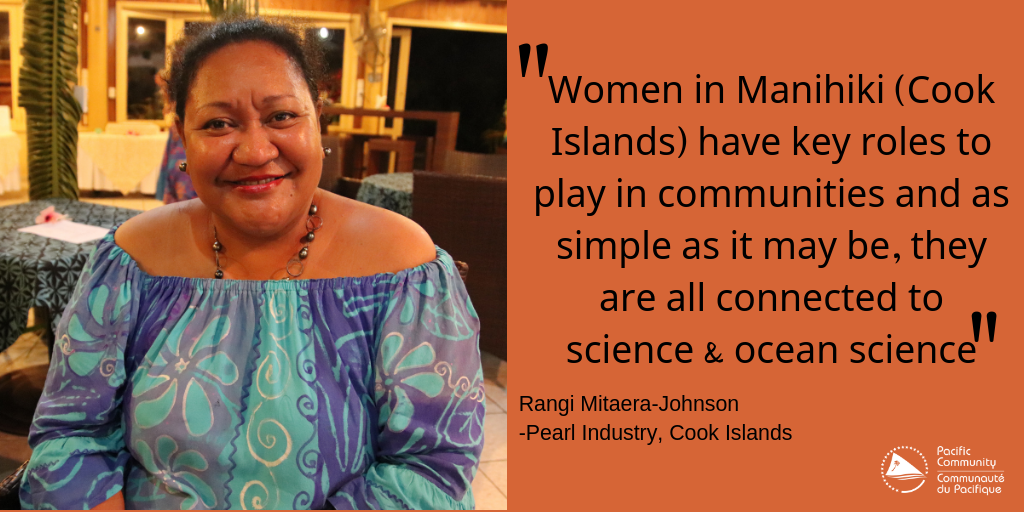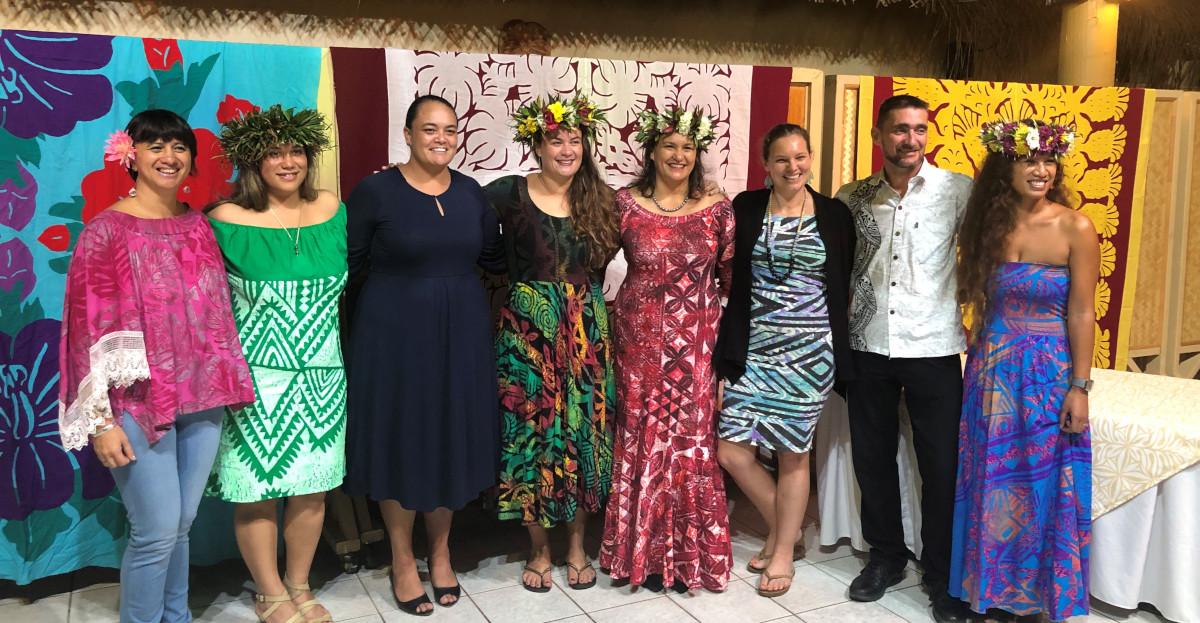Imagine a scientist.
Go ahead, humor me. What does your scientist look like?
Lab coat? Check. Test tube? Check. Snorkle?...... in the Pacific Islands, you better believe it.
Now, return to that image of a scientist. Did you imagine a man or a woman?
Around the globe, less than 30 percent of research scientists are women. According to UNESCO data (2014-2016), only around 30 percent of all female students select science, technology, engineering, and mathematics-related fields when they pursue higher education.
But at an event Celebrating Women in Ocean Science hosted in Rarotonga last month by Cook Islands Women in Maritime Association, Cook Islands Business and Professional Women’s Association, the Australian-funded Climate and Oceans Support Program in the Pacific and the Pacific Community, we heard from some truly inspiring women who are redefining our view of ocean scientists.
Here are a selection of their stories.
The Formation of an Ocean Scientist
Pamela Maru, Secretary for the Ministry of Marine Resources: Just looking out the window you can see why marine science is such an important area of interest. We’ve been fortunate to grow up in and appreciate the marine environment as it serves as our playground, our classroom and our food cupboard. As a kid, I was always thinking I would go to work with whales and dolphins. You watch documentaries on TV, Jacques Cousteau and the like, and you think, ‘Yup, that’s what I’m gonna do.’ Until you go off to study and your once narrow view of the world starts to broaden. You no longer know what it is you are going to do, but that it has to do something with that great big ocean—the one you grew up in.
Teuru Tiraa-Passfield, Marine Ecologist: Being born in a country that is 99.999% ocean and being born to environmentalist parents, it was not that surprising that I took this route. I started outrigger paddling when I was 14 years old, so that influenced me, but one of the biggest influences was a 6-week internship I did after graduating high school with Pam Maru at the Ministry of Marine Resources. It was two weeks with the offshore division, two weeks with the pearl division and two weeks with the inshore division. I got to go to Aitutaki and help with giant clam spawning and trochus harvesting. It was a really good experience and it sort of cemented my feelings that marine science was what I wanted to study.
Who Says What Isn’t Science
Alexandra Herman, Crown Law: I should put out a disclaimer, I am not a scientist. I first started out at the Seabed Minerals Authority, and I’m currently at the Crown Law Office, and throughout the last seven years I’ve been fortunate to work on a lot of issues dealing with the Law of the Sea. In my role, I’ve worked on deep sea minerals, fisheries, maritime boundaries, and ocean governance. I’ve done internships at the International Seabed Authority, spent a few months at the UN Division of Ocean Affairs in New York, so I’ve seen different layers of ocean governance from national, to regional, to global.
Rangi Mitaera-Johnson, Pearl Farmer: I love science but I am not a scientist. I come from the pearl industry. There’s a joke here in the Cook Islands that our islands are full of scientists, in particular my island, Manihiki where we farm black pearls. I suppose that’s accurate, because we love to talk about the environment and we’ve been experts at living here for the past couple hundred years, so yes. We are scientists. I feel women in Manihiki have key roles to play in communities and as simple as it may be, these roles are all connected to science. We live in a place where science is used 24/7. We live in a vulnerable environment, on a coral atoll, flights are fortnightly, we are prone to shortages, so people like us rely on monitoring and forecasting with business and management, so we have a lot of skills.

Challenges Young Scientists Face
Jacqui Evans, Director, Marae Moana: At 18, I went to university in Australia to begin a marine biology degree. I passed papers in geology, zoology, chemistry, and botany, and I also learned to survey coral reefs and conduct environmental impact assessments. I really enjoyed this so when I came home I hopeful that I could practice what I learned. Instead, I was assigned to an office job as a fisheries surveillance officer, where I collected catch reports and faxed them to the Forum Fisheries Agency. If there was a job that allowed me to practice my science I would have applied for it, but those jobs just didn’t exist.
Pam: I used to be called a bit of a pest, or so my old boss the former Secretary of Marine Resources, would say. I’d walk into his office and say “We have to do something about this now!” and he’d always tell me to “Calm down. Just listen and learn.” Over time I realised he was right. When you’re young and enthusiastic you want to effect change immediately. I’d get frustrated, but as I learned more, I realised there’s a lot more to it.
Teuru: While I’m really grateful for all the opportunities I’ve been given, one thing I noticed when I came back from university, at my time, there was a lack of mentorship culture. It sort of felt like I came back and was chucked in the deep end. “You’ve been to University, you know everything! Go and Save Manihiki Pearls!” And I knew nothing. I knew nothing compared to everybody else. There are lots of great mentors here, but there’s not enough of a push to get us together.
Ocean Science Applications
Rangi: Black pearls are a high profile item in our tourism industry and have a very important role in the development of our country. They are home grown, locally made, and they are one of the key images as soon as someone Googles Cook Islands. There have been ups and downs in our industry, with El Nino and oyster diseases in recent years. We know that science advice and forecasting are important to help us manage this and we hope that with our new secretary will inject her enthusiasm, scientific knowledge and charisma to drive the industry ahead.
Pam: For the past 6 years, I have worked with 15 Pacific Island Countries leading negotiations for the development of conservation, management measures and developing strategies and policies. This was to ensure that our people are defining and maintain their rights to tuna fisheries resources and ensuring sustainability of these resources. For the Pacific, it is imperative that we ensure the sustainability fisheries. It also means managing an entire ecosystem and the impacts tuna fisheries have on these.
Teuru: I was working for the Ministry of Marine Resources on Manihiki during the El Nino of 2015 and lagoon temperatures were over 30 degrees Celcius for over 6 months, which was very stressful for pearl oysters. We had to advise pearl farmers not to handle their shells because it would stress them further. It was quite scary to see how climate change can affect people’s livelihood for a very long time. During that time there was also a lot of coral bleaching, but with the measures in place, we saw most of the area recover.
Supporting Women in Science
Jacqui: The Cook Islands Ministry of Education has been very good by encouraging girls to study science. We need to ensure that women have the opportunity to practise their science when they graduate. One of the objectives of the Marae Moana Policy is to foster a culture of investigation and research. In this way, we can encourage a demand for statistics and data. I’d also like to see a forum for young Cook Islands women to share their knowledge, expertise, perspectives, and recommendations with government agencies and the community.
Alex: I’ve been really fortunate to have great mentors and people who believe in me even when I didn’t believe in myself and pushed me to go for opportunities or roles I wouldn’t have necessarily gone for. The funny thing is, a lot of my mentors over the years have been men. When we think about championing our women in science, it does not need to be women pushing women. We can have male gender champions.
Rangi: I was privileged to work with three amazing scientists from Marine Resources over the last few years- they were all women! We shared a lot of knowledge. I shared my experiences and they would give me the science part of it. One year on Manihiki we hosted the first ever science fair. It was an opportunity to discuss science with our children and to open up their minds to science. One of my roles was to translate science so that the general public could understand it. It was really hard at first because we don’t have science terms in the local language. But because we were able to translate it we now have more people involved and interested in science.
Integrated Ocean Science for the Future of the Pacific
Pam: I realised there was a need to use science-informed policy to reverse the degradation of ocean health. This aligned with my eventual realisation that no matter how much I annoyed my boss with my latest findings, the only way to effect change was to BECOME the boss. I also discovered it was necessary to merge my science background with other disciplines such as the legal, economic, technological and social sciences that all inter-relate and contribute to the marine environment space. This can contribute to the development of sustainable resource management policies. And while I’ve learned a lot thus far, there is still more research, more to understand and know about our oceans.
Alex: While I am not a scientist, I am a Pacific Islander. We are ocean people. It is part of our culture, our history. It’s our way of life. You might not work in science, but you have a role to play. It can be something as simple as recognising that women can be great leaders, and seeing our young female science graduates coming through and developing them. All of us here have a role to play as stewards of the ocean.
